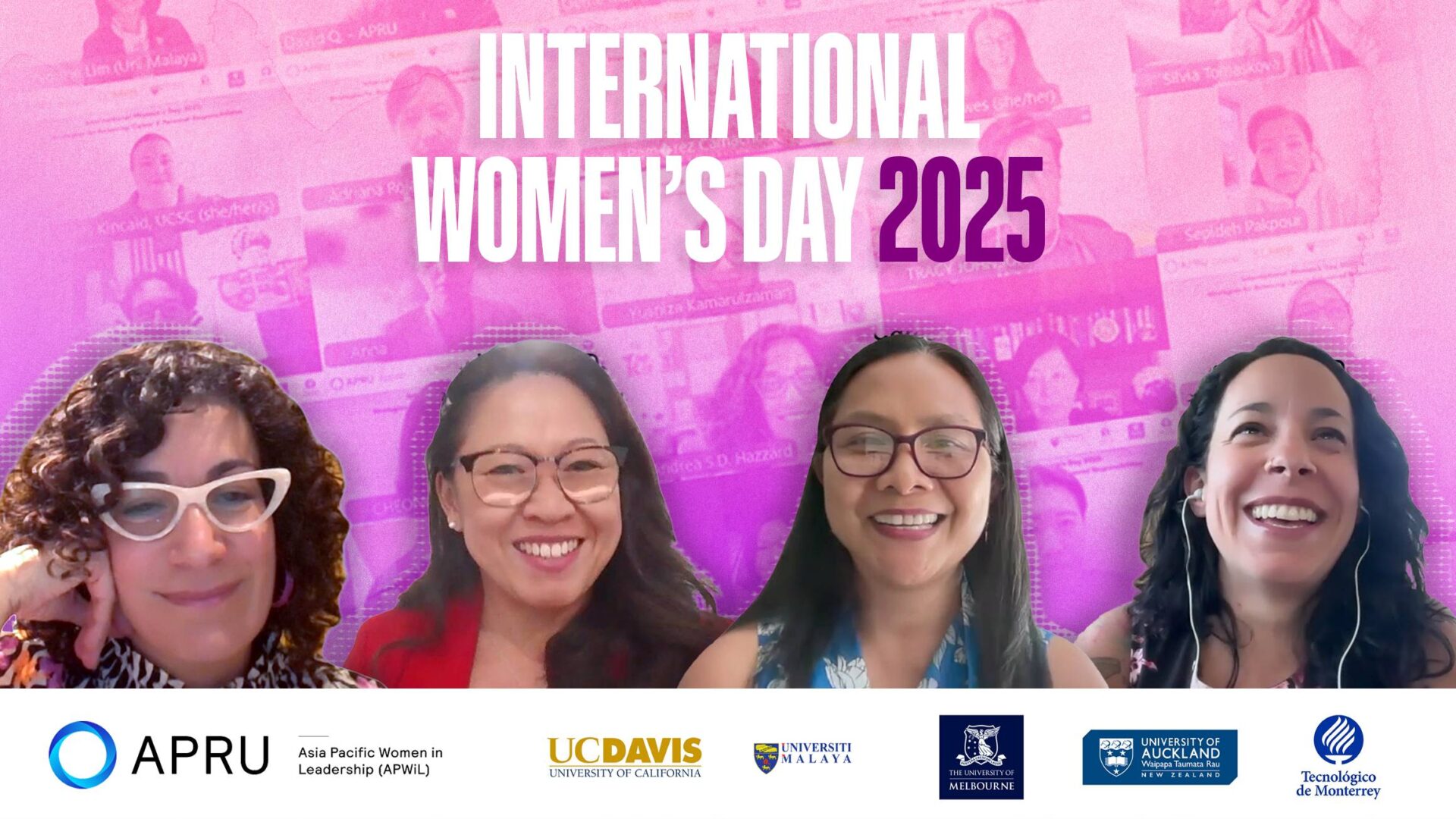This year, in honor of International Women’s Day, APRU’s Asia Pacific Women in Leadership Program (APWiL) hosted a webinar featuring four distinguished women academic leaders. The event brought together women who have navigated the complexities of balancing professional ambitions with personal responsibilities. Their stories and insights highlighted some of the challenges faced by women today, as well as some strategies that have helped them maintain their well-being and self-fulfilment. In today’s fast-paced world, women often find themselves dealing with multiple roles: they are academics, professionals, mothers, daughters, wives, partners, and leaders; all while trying to nurture their own personal and career growth.
Moderated by Professor Yvonne Ai Lian Lim, Co-Chair of APWiL, the webinar featured Dr. Gabriela Baron from the University of Auckland; Dr. Iderlina Mateo-Babiano from University of Melbourne; Dr. Marian Mahat from University of Melbourne; and Professor Vania Ramírez Camacho from Tecnológico de Monterrey (check their bios here). Each of these women comes from a unique context and has her own story of growth and strength during moments of change and overcoming obstacles.
During the webinar, the conversation focused on the most relevant challenges of balancing work life, personal life, and well-being, particularly for women in academia and leadership positions. One of the main topics was the importance of establishing and respecting personal boundaries in professional and personal spheres. As the speakers noted, the pressure to excel in every aspect of life can be quite overwhelming and it’s crucial to recognize when to say ‘no’ and focus on self-care and mental health.
The academic leaders noted that engaging in hobbies, spending time with their families, and resting is essential for sustaining energy and focus. Dr. Iderlina Mateo-Babiano emphasized that self-compassion is key to well-being, especially when juggling the many demands of career and family life. She talked about embracing vulnerability in her journey, finding strength in her faith and family, especially after experiencing a career setback. This vulnerability, she explained, was not a weakness but a source of growth, helping her move forward with renewed purpose and clarity.
Likewise, Dr. Marian Mahat also reflected on her journey toward balance. She recounted the constant exhaustion of chasing perfection in both her personal and professional life. Over time, she realized that striving for perfection often led to missed opportunities and a sensation of burnout. Instead of endlessly pursuing an unattainable target, she shifted her focus to valuing progress over perfection. This is how, by learning to let go of unrealistic expectations, she found a more sustainable way to achieve her objectives.
“Sometimes, striving for perfection means missing the moment altogether.”
Dr. Marian Mahat.
On the other hand, Dr. Gabriela Baron’s story revolved around her transformative experience of leaving a toxic work environment back in her home country. Her decision to step away from an unhealthy situation proved to be a catalyst for growth. She emphasized that success doesn’t have to adhere to traditional structures or expectations. Leaving her previous workplace allowed her to reevaluate not only her expectations of a healthy academic environment but also her values and redefine what success meant on her own terms.
Similarly, Professor Vania Ramírez Camacho spoke about the evolution of her professional priorities, and she highlighted how, over time, her vision has shifted in response to the different stages of life and the demands of her professional and personal responsibilities. She pointed out the need to balance the early-career ambitions and energy with the duties and responsibilities that come with midlife as time goes on. Her advice is clear: you have to choose your battles wisely and prioritize what matters the most to you. The ability to understand when to step back, when to fight, and when to let go is essential to maintaining balance.
“You have to learn to choose your battles in all spheres, in the professional one and the personal one.”
Prof. Vania Ramírez Camacho
In addition to personal strategies, the speakers also discussed the importance of institutional support, such as flexible working arrangements and policies that prioritize well-being were pointed out as crucial in helping women balance their responsibilities and spending more valuable time with their families. Informal support networks, especially among women colleagues, were also seen as vital in fostering resilience. These relationships provide emotional support, shared experiences, and a sense of community that can make a significant difference in managing the pressures of academia and leadership.
Ultimately, the stories shared by the speakers highlighted a general truth: life is constantly evolving and changing. Balance is not a static state, but a continuous process of adjustment and adaptation. By embracing these changes, choosing battles wisely, and focusing on the things that truly matter, women can find fulfilment in both their personal and professional lives.
You can watch the full webinar at APWiL’s YouTube playlist here.
About APWiL and the APWiL Mentoring Program As leaders, the universities of APRU are committed to leading by example, addressing gender imbalances on their own turf through various initiatives. The Asia Pacific Women in Leadership Program (APWiL) aims to drive change in gender equality while taking into account the various contexts in which this pursuit for gender equity takes place across APRU member universities.
The APWiL Mentoring Program is a year-long commitment matching a mentor and mentee from one of the participating APRU member universities to provide international and intercultural opportunities for the empowerment of aspiring women leaders within APRU.
Learn more about APWiL and it’s mentoring program here.

